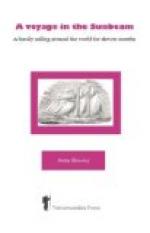Near the beach we found the remains of a recent fire, and in the course of the night the watch on deck, which was doubled and well-armed, heard shouts and hoots proceeding from the neighbourhood of the shore. Towards morning, too, the fire was relighted, from which it was evident that the natives were not far off, though they did not actually put in an appearance. I suppose they think there is a probability of making something out of us by fair means, and that, unlike a sealing schooner, with only four or five hands on board, and no motive power but her sails, we are rather too formidable to attack.
Monday, October 9th.—We are indeed most fortunate in having another fine day. At 6 a.m. the anchor was weighed, and we resumed our journey. It was very cold; but that was not to be wondered at, surrounded as we are on every side by magnificent snow-clad mountains and superb glaciers. First we passed Snowy Sound, in Tierra del Fuego, at the head of which is an immense blue glacier. Then came Cape Notch, so called from its looking as if it had had a piece chopped out of it. Within a few yards of the surrounding glaciers, and close to the sea, the vegetation is abundant, and in many places semi-tropical, a fact which is due to the comparatively mild winters, the temperate summers, the moist climate, and the rich soil of these parts. Passing up English Reach, we now caught our first glimpse of the Pacific Ocean, between Cape Pillar on one side, and Westminster Hall, Shell Bay, and Lecky Point, on the other. Steering to the north, and leaving these on our left hand, we issued from the Straits of Magellan, and entered Smyth’s Channel, first passing Glacier Bay and Ice Sound, names which speak for themselves. Mount Joy, Mount Burney, with its round snow-covered summit, rising six thousand feet from the water, and several unnamed peaks, were gradually left behind; until, at last, after threading a labyrinth of small islands, we anchored for the night in Otter Bay, a snug little cove, at the entrance to the intricacies of the Mayne Channel.
[Illustration: Glaciers. Snowy Sound.]
It was almost dark when we arrived, but the children, Captain Brown, and I, went on shore for a short time, and gathered a few ferns and mosses. We also found the embers of a fire, which showed that the natives were not far off, and we therefore thought it prudent to hurry on board again before nightfall. No names of ships were to be seen; but, in our search for ferns, we may possibly have overlooked them. We have not come across any Fuegians to-day, though in two of the places we have passed—Shell Bay and Deep Harbour, where a few wigwams are left standing as a sort of head-quarters—they are generally to be met with. During the night the watch again heard the natives shouting; but no attempt was made to re-light the fire we had noticed, until we were steaming out of the bay the next morning.




